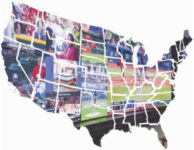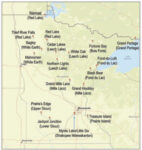
Mel Tomasket, a pioneer in the American Indian self-determination movement of the 1970s and a member of the tribal council for the Confederated Tribes of the Colville Reservation in Washington state, occasionally will find himself a bit conflicted.
“I’m in a funny position. I wear my hat sideways a lot,” Tomasket says of his dual roles as a tribal councilman and member of the commission that regulates Colville’s government casinos.
Tomasket is aware it’s best to keep whatever opinions he has on how to manage tribal business enterprises to himself. But he finds the urge a bit too much, for example, when he notices menu prices at the tribal casinos are a bit high.
“It’s difficult for us on the tribal council to keep our political hands out of the economic businesses,” Tomasket says, particularly when tribal elders complain to him that they can’t afford to eat at the tribe’s Mill Bay and Coulee Dam casino restaurants.
“We might get complaints our food costs too much,” he says. “But how much pressure do we put on the board of directors for the tribal business corporation, or the director of gaming, so we can bring things back to reality and help increase the business?
“I’m sure other tribal councils have the same problem. Or issue. Or concern.”
Political Influence
Tribal governments have historically grappled with the need to keep political hands out of day-to-day business decisions, particularly with the dramatic economic and social progress achieved with passage of the Indian Gaming Regulatory Act of 1988.
Most tribes with experience in government enterprises—many in reservation natural resources such as coal and timber—have learned to separate politics from business. The Chickasaw Nation of Oklahoma, Southern Ute Tribe of Colorado and Winnebago Tribe of Nebraska have development corporations skilled in overseeing a vast portfolio of enterprises.
But the issue is heavily nuanced with smaller indigenous communities where the familial ties are strong and whose economic development efforts largely began with government casinos.
The profiles of the 366 federal recognized Indian tribes in the lower 48 states vary dramatically, from small enrollment bands in California to the larger reservations in the Great Plains and Midwest.
“Some of these tribes have a long history of managing businesses,” says Jamie Fullmer, former chairman of the Yavapai-Apache Nation of Arizona and CEO of Blue Stone Strategy Group, which consults with tribes on economic development.
“Other tribes are just getting into diversifying their business economies outside of gaming, natural resources, timber, fishing or whatever their primary revenue driver is.”
“For many tribes gaming is their first experience in running a government enterprise,” says Dr. Katherine Spilde, chair of the Sycuan Institute on Tribal Gaming at San Diego State University.
“It’s hard to make sweeping generalizations,” says Bill Lomax, a member of the Gitxsen Nation of Canada and president of the Native American Finance Officers Association (NAFOA).
Many tribes accelerating economic diversification efforts in the wake of a decade-long plateauing of tribal casino revenues are attempting to keep tribal politics from getting in the way of business development, both on and off the reservation.
“There is a desire among tribes to set up separate economic development corporations to be able to create autonomy,” says Kristi Jackson, vice chairwoman and CEO of Tribal Financial Advisors. How the government and economic development is structured “depends on the tribe,” she says. “But where there’s a will, there’s a way.”
A number of tribes have adopted business strategies modeled after Harvard University’s Project on American Indian Economic Development and the Native Nations Institute at the University of Arizona.
The hallmark of the Harvard and Native Nations plans recommends vesting long-term economic strategies and land use policy to tribal councils as representatives of the indigenous citizens.
But to ensure success and an ability to compete, experts believe business enterprises should be operated independent of tribal politics.
“It is appropriate that strategic decisions regarding the disposition of reservation resources and the character of reservation life be brought into the political arena,” Harvard economics professor Joseph Kalt testified in 1996 before the Senate Committee on Indian Affairs.
“This does not mean, however, that tribal governments should make all or even a significant number of the day-to-day business decisions on reservations,” he said. “Inserting politics into day-to-day business decisions invariably undermines efficiency and productivity, saps the resources of the organizations and runs enterprises into the ground.”
A number of tribes with Bureau of Indian Affairs constitutions drafted with passage of the Indian Reorganization Act of 1934 have business enterprises under tax-exempt Section 17 federal corporations. Others utilize state corporations subject to state taxes and regulations.
Still others have tribal corporations, such as the highly regarded Ho-Chunk Inc., the economic development arm of the Winnebago Tribe of Nebraska, with 30 subsidiaries in the United States and five foreign countries.
Chickasaw Nation Industries, Inc., a federally chartered corporation wholly owned by the Chickasaw Nation of Oklahoma, serves as holding company for a dozen subsidiaries.
And the Southern Ute Tribe of Colorado established the Southern Ute Growth Fund, which manages the tribe’s extensive energy production and real estate investments.
“What structure works for one tribe will not work for another,” says Levi Esquerra, program director for Northern Arizona University’s Center for American Indian Economic Development.
Accelerating Diversity
With the plateauing of the $28.5 billion tribal casino industry—the result of market maturation and the recession of 2008—Indian communities are accelerating efforts to diversify their business portfolios. The more successful tribes have formed corporate structures and acquired skilled management free of political pressure.
Tribes also have improved their business acumen, in many cases as a result of casino financing ventures.
In addition, many tribal leaders who have grown to adulthood in the tribal self-determination era are looking to advance government independence in attaining community economic and social progress.
“You can’t just build on your gaming forever,” Jackson says. “There’s a move to find new avenues for growth. It’s no longer, ‘I’m going to build more on my reservation.’ Tribes are looking beyond their reservation borders.”
“You are seeing tribes do their best to diversify and try to establish other economic engines,” Esquerra says.
Maintaining a continuous economic strategy can be difficult with tribal elections every two to four years.
“Different administrations want to set up their own projects and establish their own priorities,” Esquerra says.
“During the political changeovers those separate enterprise entities are looked at and changes are made,” Fullmer says.
Role of the Tribal Council
While there are advantages to an economic strategy that remains consistent with changing administrations, council input in economic affairs is often necessary in representing the will of the corporate shareholders, which in the case of tribal businesses are the indigenous citizens.
“Regardless of whether there is a separate enterprise corporation, there are certain things the tribal government needs to be involved with and agree to,” Jackson says. “After all, it’s the tribe that needs to sign these debt agreements.”
“Sometimes there is too much separation,” Fullmer says. “It’s important that the enterprise board and management team is reporting to the community so there isn’t a distrust being created.”
Tribal councils must be involved in decisions regarding both trust and fee lands in private ownership within reservation boarders.
“The tribal council is responsible for overseeing use of tribal trust land,” Fullmer says. “Council members are not just going to hand that over to their business enterprises. They are responsible for leasing it out or obligating it.”
“Separating the two functions (tribal councils and government enterprises) shouldn’t mean the tribal leaders and tribal citizens don’t have a say in business decisions,” Spilde says. “Nobody would claim that tribal economic development is not inherently political.
“There should be a partnering between the institutions.”
Tribal economic strategies and enterprise governing authorities can undergo sudden and often violent upheavals. That has been the case when issues such as per-capita distributions of casino revenues resulted in leadership changes in general elections and recall votes.
“Indian gaming has been a savior to Indian Country, but it’s also been a curse,” says a tribal official who requested anonymity. “And the curse is per capita.”
But there are times when change is necessary.
Spilde says tribes have an advantage over non-Indian governments in that they are flexible to change.
“That’s how many governments fail, not being able to change and adapt to changing circumstances,” she says. “It’s not about building the perfect system. It’s about building a system that can be innovative.
“Tribes get to decide how these institutions are to be formed,” Spilde says. “Then they can change them, very quickly.”
Balancing Act
“There has to be clear communication between management, enterprise boards and tribal councils,” says Muckleshoot Casino General Manager Conrad Granito, who has operated six tribal casinos. “You find those challenges in any operation.”
While Granito believes in an open-door policy, encouraging tribal leaders to bring complaints and observations to his attention, he hasn’t experienced any serious meddling.
“I don’t get the calls, ‘Why did you fire my cousin?’ or ‘Why are you charging $6 for a grill cheese sandwich?’” Granito says.
But he realizes those complaints are often directed at tribal leaders.
“When you change the cheese on the grilled cheese sandwich, they (tribal officials) are going to get a call,” Granito says. “I realize that. I tell them, ‘When you guys (tribal officials) hear something, tell me.’”
Derrick Watchman, CEO of Navajo Nation Gaming Enterprise, which manages four tribal casinos, has a more formal line of communication with a tribal council that oversees a three-state reservation with 300,000 citizens.
“I have two people assigned to lobby, to update, to keep big Navajo—the Navajo government—informed about what we’re doing,” Watchman says.
There has been some criticism over decisions on reinvesting and dispersing casino revenue, he says, but issues of meal prices do not disturb him at all.
“We were charging five-star prices and we were a three-star town,” he says of the flagship Twin Arrows Casino Resort outside Flagstaff, Arizona. “Over time I got it. Now we’re in line. But obviously I got a lot of flak from our leadership.”
There were occasions in the past when Tomasket thought directors of the Colville Tribal Federal Corporation (CTFC), which manages 13 enterprises including the two casinos, were not engaged enough in managing the businesses.
But he was hesitant to speak out, in part because he was friends or acquaintances of many of the 10,000 tribal citizens, including the five CTFC directors.
“It’s difficult is when you live in an area where you know so many people,” Tomasket says. “You try to bring it up to them—knowing you don’t have the authority to tell them what to do or not to do—but if they don’t respond, what do you do?”
Tomasket believes in diplomacy when passing on suggestions to CTFC directors or enterprise managers.
“I talk to them as a friend,” he says. “I don’t order them around. I say, ‘This is what I’ve noticed. You might want to take a look at it.’
“I don’t believe in bullying or interfering, though I suspect some tribal councils might do that.
“Each tribe has its own set of circumstances.”










